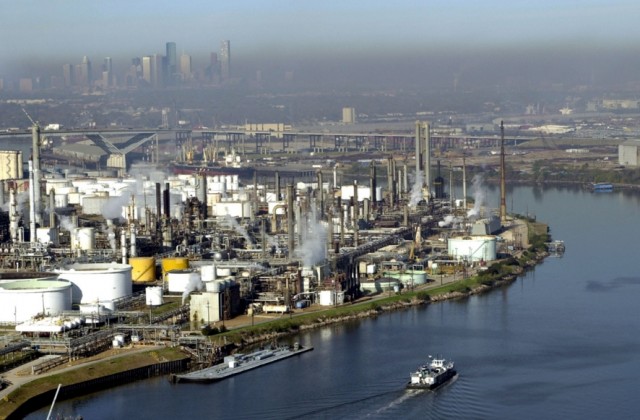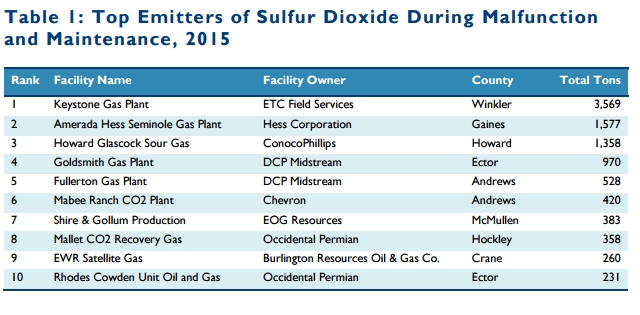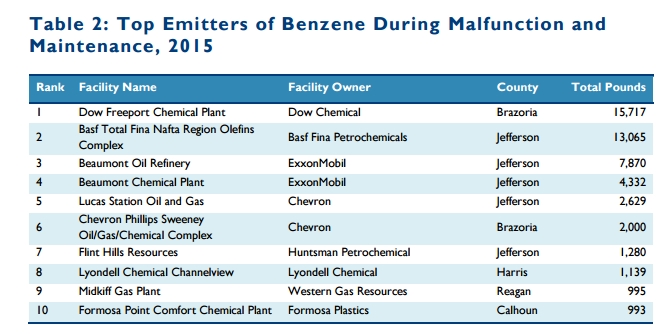
As the old saying goes, “Everything is bigger in Texas,” and unfortunately that does not exclude toxic industrial admissions. A new analysis conducted by Environment Texas and the Environmental Integrity Project found that 68 million pounds of air pollution, the majority of which was released illegally, entered into the atmosphere last year.
About “679 industrial sites in more than 100 Texas counties released more than 34,000 tons of air pollutants during 3,421 incidents of malfunctions and maintenance events,” the environmental groups learned through data self-reported by the industry.
“Well known for its hands-off approach to environmental enforcement, Texas allows industries to release excessive amounts of air pollution when old and poorly controlled equipment breaks down and when facilities undergo maintenance work,” the report concludes.
Large quantities of cancer-causing benzene released into Houston skies
“From high levels of cancer-causing benzene in the heavily populated neighborhoods from Houston to the Louisiana border, to unprecedented releases of dangerous hydrogen sulfide in the West Texas oilfields, industrial facilities are releasing large amounts of air contaminants during breakdowns and maintenance.
“Most of this pollution is unauthorized, or well over the limits set in the facilities’ permits. This unauthorized air pollution not only threatens public health and our environment, but also our confidence in the regulatory agencies charged with enforcing anti-pollution laws.”
Researchers learned that substantially more air pollution occurs during malfunctions and maintenance at industrial plants than it does during routine operations.
“For example, in 2014, the Keystone Gas Plant in West Texas released 226 tons of sulfur dioxide during routine, permitted operations, but the plant released 5,493 tons of this dangerous pollutant during malfunctions.
“In 2015, the Keystone plant released 3,569 tons of sulfur dioxide during equipment breakdowns, including a single malfunction that lasted for six months,” according to the report.
Short-term exposure, ranging from five minutes to 24 hours, to sulfur dioxide in the air may cause multiple adverse respiratory effects such as “bronchoconstriction and increased asthmatic symptoms,” according to the Environmental Protection Agency. The elderly, children and people with asthma are the most at risk for being hospitalized due to sulfur dioxide exposure in the air.
 Dow Chemical, Shell, ExxonMobil and Chevron among Texas’ worst polluters
Dow Chemical, Shell, ExxonMobil and Chevron among Texas’ worst polluters
Shell’s Deer Park oil refinery in Houston was the largest polluter last year, releasing 171 tons of air pollution during a one-hour breakdown in August. Among those emissions included 150 tons of 1,3-butadiene, a carcinogen linked to cardiovascular disease and leukemia.
Out of all the industries, the oil and gas industry is the biggest offender, “releasing more acid rain-causing sulfur dioxide, and more smog-causing and often toxic volatile organic compounds from malfunctions than any other industrial sector.”
The oil and gas industry seemingly considers malfunctions as part of its business model. Data from 2014 shows oil and gas producers released 10,021 tons of sulfur dioxide into the atmosphere during malfunctions and maintenance, which is 41 percent of the industry’s annual emissions.
 However, the pollution extends beyond the oil and gas fields.
However, the pollution extends beyond the oil and gas fields.
Why the EPA needs to step up
“Refineries and chemical plants along the Gulf Coast are among the state’s worst emitters of unauthorized pollution during breakdowns and maintenance. In 2015, Dow Chemical’s Freeport plant, just south of Houston, released 15,717 pounds of the carcinogen benzene during equipment malfunctions and maintenance activity, more than any other facility in the state.”
Troubling is the fact that these same plants break down year and year, releasing more and more toxins into the air.
“State environmental regulators have the tools they need to protect our health from dangerous air pollution, but enforcement is inconsistent.
“In addition, the U.S. Environmental Protection Agency can do more to see that Texas follows federal permitting rules, which prohibit industrial plants from routinely releasing excessive air pollution during malfunctions and maintenance events. Swift and consistent enforcement of laws already on the books is the most effective way for regulators to rein in rogue polluters.”
Austin has considerably less pollution than other Texas cities, but it is not immune. Some 32,000 pounds of air pollution were released into Austin’s air last year, the majority of which was discharged from the Luling Gas Plant, owned by Davis Gas Processing, on November, 24.
The incident poured more than 30,000 pounds of pollutants in the air.
Sources:

